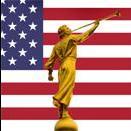-
Posts
2354 -
Joined
-
Last visited
-
Days Won
10
Reputation Activity
-
 LeSellers got a reaction from Blackmarch in We need each other, and it's getting more and more important
LeSellers got a reaction from Blackmarch in We need each other, and it's getting more and more important
I'd like to talk about the areas where we need not (and should not) talk about doctrinal differences, but those where our common beliefs and needs require our mutual support and efforts.
There are more, I'm sure, but I see three major aras where we can and must work together:
1) protecting the Family from assaults, political and cultural, on this fundamental insitution of civilization.
2) protecting marriage from simiilar assaults.
3) protecting our freedom to believe and to practice our faiths according to the dictates of our own consciences.
Historically, we LDSs have experienced official oppression, pogroms, and fer shure, we don't want to go through that again. But, as Joseph Smith said, we are just as willing to fight for the rights of a Presbyterian, or a Pentacostal, or a Catholic as for our own.
However, we are not a large church. We need others to help us fight our common battle. And we are far more than willling to help others with their skirmishes and fights, as well.
The first question I propose is how can we work together to attain and regain our cultural right to worship as we choose?
The second question is how can we work together to assure that our children and grandchildren have a chance to raise their children in a world where fathers and mothers are the primary responsible and official leaders of their families?
The third question is similar: how can we work together to retain the status of traditional marriages between men and women as the fundamental element of civilization?
Except to define our common goals and their basis in theology and doctrine, we should not get into tenets and beliefs. For these ends, we are trying to come to an agreement on means and end, of tactics and strategies. We should help each other identify local (or regional) leaders of any church we can who might be helpful in reaching these goals.
How?
I don't know. That's why we're here in this topic.
Letter writing campaigns? Maybe
Common theatrical productions? Interesting.
Musical presentations? Possibly.
So, what are your ideas?
I (and I hope others) await your suggestions and ideas and the discussion of these three questions. If you have additional ways we can assist each other, this is where we can enlarge and build on them.
Lehi
-
 LeSellers got a reaction from EarlJibbs in Really Questioning the Garment
LeSellers got a reaction from EarlJibbs in Really Questioning the Garment
There is a third thing that the garment of the Holy Priesthood does for us: it is the part of the Temple that we bring out of the sacred building with us to have in our worldly lives. It has the tokens of the Temple in it. It has the signs of the covenants we have made. It makes us part of the Temple, in a way.
I served in the USArmy a long time ago. I, too, had the garment, and it was difficult to keep it sacred in the den of iniquity that was 3d PLT, C (Basic Training) Company, 45th Battalion. No, not "difficult", impossible. Drill Sergeants found out I was a Mormon and made life unpleasant, not least because of the garment. I went to Officers' Candidate School in Ft. Benning, Georgia, back in the 1970s. One of the men in the class ahead of me was a close LDS friend. He suggested I put it aside for the first eight weeks of the program. I followed his advice. I am sorry I did. It turned out that I was "recycled" on the last day of the course. I went through the entire program a second time. This time, I wore the garment, and, as in Basic Training, keeping it sacred was a full-time job. I did it, and I am grateful for the experience.
I've lived in California's Sacramento Valley. It frequently gets into the 110s for weeks at a time, not dropping below 80 at night. It was inconvenient to wear the Garment of the Holy Priesthood on those days. We, my Jacquie and I, did it. Not because it was convenient, not because it was healthy, not because it was chic. We did it because we had made a covenant to wear it night and day throughout our lives.
We've all heard people complain about the garment. It is a sacrifice, they say. And I say, yea, verily, it is a sacrifice. And sacrifices are what make us saints, what make us God's holy people, what make us His.
"Putting on the garment," our Temple President used to say, "is what helps me remember my covenants every day." And obeying those covenants is what will, eventually, allow me to stand before Christ's pleasing bar and know I am His, and that, for me, He will turn to His Father and say, "Father, here is my son. Wilt Thou let him enter into thy kingdom?"
Lehi
-
 LeSellers got a reaction from NeedleinA in Teaching my kids about LDS History
LeSellers got a reaction from NeedleinA in Teaching my kids about LDS History
I wish I had said it first, but I'll gladly say it again: I have a testimony of the Lord Jesus Christ. I have a testimony of His Church and of His Gospel. I do not have a testimony of church history.
There are some truths that are more important than others, but I believe that "innoculating" our children against the slanders of those who would distort trival and even not-so-trivial events in church history is good practice. I'd much rather them hear that Joseph had twelve (or twenty-five) wives from me than from IRR. I can give them the context and the rationale. I can tell them of brother Brigham's aversion to the Principle and how he came to be converted to it. I can put Plural Marriage in its proper frame, and show how it is not only a principle of righteousness, but how it is a principle of charity and virtue.
Their being blindsided by vicious liars who use the truth as Satan did in the Garden of Eden: to sell his lies, does no one any good. I believe it has caused more heartache than any other source of apostasy.
That said, the important thing in all of this is that the Church is true, the Gospel is true, the Priesthood of God is the power of God, and that He has established His prophets from Joseph Smith onward as His spokesmen. They are human, and make mistakes, like all humans (Christ excepted), but that their mistakes and even their sins are not sufficient cause to ignore them and their work. It is a grave thing to accuse a prophet of serious sin and apostasy. I will leave that up to God, and I hope my children and grandchildren know that it is not their job to confess other people's sins, even when that other person is a prophet.
Lehi
-
 LeSellers got a reaction from Vort in Will everything be made right?
LeSellers got a reaction from Vort in Will everything be made right?
It's not fixed -- you are.When it doesn't matter any more, you're fixed.
When there is more to your life than the issue at hand, you're fixed.
When the problem is no longer your problem, when it becomes Jesus' problem, you're fixed.
I don't pretend to understand anyone's problems but my own (and not all of them). I don't pretend to have allowed Christ to assume all my hurts and sufferings. But I know that when I have permitted Him to take them on, when I give them up, it is fixed as far as I'm concerned. And that's the best I can do.
I hope your situation improves. I hope you "drop [your] burden at His feet". Because, as He says, "[His] yoke is easy, and [His] burden is light." So, when you let Him take yours, and you take His, He carries the heavy load, and all you need do is pick His up and take it along for the walk.
I will let you in on an open secret: If you really want to get fixed, you need to find someone whose needs are greater than yours, and make him happier. It could be a sister in the ward, it could be a family down the street. It could be your uncle Ed, or a niece, or a total stranger. Find out what he needs, do it for him, and you'll be happier. When you've finished, your burden will be lighter, and you may find that you have already done all you can do. Then, Christ will make up the difference for you.
Lehi
-
 LeSellers got a reaction from Backroads in Really Questioning the Garment
LeSellers got a reaction from Backroads in Really Questioning the Garment
There is a third thing that the garment of the Holy Priesthood does for us: it is the part of the Temple that we bring out of the sacred building with us to have in our worldly lives. It has the tokens of the Temple in it. It has the signs of the covenants we have made. It makes us part of the Temple, in a way.
I served in the USArmy a long time ago. I, too, had the garment, and it was difficult to keep it sacred in the den of iniquity that was 3d PLT, C (Basic Training) Company, 45th Battalion. No, not "difficult", impossible. Drill Sergeants found out I was a Mormon and made life unpleasant, not least because of the garment. I went to Officers' Candidate School in Ft. Benning, Georgia, back in the 1970s. One of the men in the class ahead of me was a close LDS friend. He suggested I put it aside for the first eight weeks of the program. I followed his advice. I am sorry I did. It turned out that I was "recycled" on the last day of the course. I went through the entire program a second time. This time, I wore the garment, and, as in Basic Training, keeping it sacred was a full-time job. I did it, and I am grateful for the experience.
I've lived in California's Sacramento Valley. It frequently gets into the 110s for weeks at a time, not dropping below 80 at night. It was inconvenient to wear the Garment of the Holy Priesthood on those days. We, my Jacquie and I, did it. Not because it was convenient, not because it was healthy, not because it was chic. We did it because we had made a covenant to wear it night and day throughout our lives.
We've all heard people complain about the garment. It is a sacrifice, they say. And I say, yea, verily, it is a sacrifice. And sacrifices are what make us saints, what make us God's holy people, what make us His.
"Putting on the garment," our Temple President used to say, "is what helps me remember my covenants every day." And obeying those covenants is what will, eventually, allow me to stand before Christ's pleasing bar and know I am His, and that, for me, He will turn to His Father and say, "Father, here is my son. Wilt Thou let him enter into thy kingdom?"
Lehi
-
 LeSellers reacted to The Folk Prophet in Will we still worship and pray to God in the afterlife?
LeSellers reacted to The Folk Prophet in Will we still worship and pray to God in the afterlife?
...which has no meaning whatsoever as to the reality of the eternities... ...but....
Are you not worshiped by your children?
I certainly understand the sentiment of being uncomfortable at the idea of it. I had a guy after church come up to me today and tell me how spot on a comment I made was. Even this made me uncomfortable. But having a child, particularly my own, view me in a hero sense or have emotions and thoughts concerning me that are akin to worship doesn't bother me in the slightest. In fact, if my child didn't feel that way about me I'd be concerned and sad and feel like I needed to work on my fathering skills.
What's the difference? Well...small children are so much lower than me on the scale of intelligence and understanding that I expect the ones who love me dearly to have such sentiment. If we step back and view our insignificance compared to the Lord in intelligence and understanding, does not our worship of him equate? If we then consider the relative state of our hoped-for exalted lives as compared to the state of our progeny, it strikes me that from a logical perspective, there's nothing uncomfortable about it whatsoever.
-
 LeSellers got a reaction from Vort in Really Questioning the Garment
LeSellers got a reaction from Vort in Really Questioning the Garment
There is a third thing that the garment of the Holy Priesthood does for us: it is the part of the Temple that we bring out of the sacred building with us to have in our worldly lives. It has the tokens of the Temple in it. It has the signs of the covenants we have made. It makes us part of the Temple, in a way.
I served in the USArmy a long time ago. I, too, had the garment, and it was difficult to keep it sacred in the den of iniquity that was 3d PLT, C (Basic Training) Company, 45th Battalion. No, not "difficult", impossible. Drill Sergeants found out I was a Mormon and made life unpleasant, not least because of the garment. I went to Officers' Candidate School in Ft. Benning, Georgia, back in the 1970s. One of the men in the class ahead of me was a close LDS friend. He suggested I put it aside for the first eight weeks of the program. I followed his advice. I am sorry I did. It turned out that I was "recycled" on the last day of the course. I went through the entire program a second time. This time, I wore the garment, and, as in Basic Training, keeping it sacred was a full-time job. I did it, and I am grateful for the experience.
I've lived in California's Sacramento Valley. It frequently gets into the 110s for weeks at a time, not dropping below 80 at night. It was inconvenient to wear the Garment of the Holy Priesthood on those days. We, my Jacquie and I, did it. Not because it was convenient, not because it was healthy, not because it was chic. We did it because we had made a covenant to wear it night and day throughout our lives.
We've all heard people complain about the garment. It is a sacrifice, they say. And I say, yea, verily, it is a sacrifice. And sacrifices are what make us saints, what make us God's holy people, what make us His.
"Putting on the garment," our Temple President used to say, "is what helps me remember my covenants every day." And obeying those covenants is what will, eventually, allow me to stand before Christ's pleasing bar and know I am His, and that, for me, He will turn to His Father and say, "Father, here is my son. Wilt Thou let him enter into thy kingdom?"
Lehi
-
 LeSellers reacted to Backroads in Paid for, never got!
LeSellers reacted to Backroads in Paid for, never got!
I'm not sure of how this lady runs her business, but I'm the type that would leave, if possible, reviews about my experience. People pay attention to that stuff.
-
 LeSellers got a reaction from Traveler in Difference in doctrine
LeSellers got a reaction from Traveler in Difference in doctrine
You'll never find me defending the ex nihilo heresy. It makes no sense in any universe: not scientific, not religious, not philosophical.Lehi
-
 LeSellers got a reaction from Jane_Doe in Clearing up misconceptions: Galatians1 6-9 VS TBOM
LeSellers got a reaction from Jane_Doe in Clearing up misconceptions: Galatians1 6-9 VS TBOM
Byron makes unwarranted assumptions about several things in this topic.
First, he apparently assumes that "Gospel" means only the four Gospels: Matthew through John. The context of the very passage he cites makes that assertion false. Paul is speaking of the Gospel he preached. Others have shown that the Gospels, as texts, had not all been written when he penned Galatians. Even had they, he did not preach the texts of the Gospels. This fact is attested by the rest of the first chapter and, indeed, the whole epistle.
Part of his argument is that the Greek word euangelikos means "good news" (in Old English, "gut speil", whence "gospel"). So? Rather than support it, this undermines his position, since "good news" is hardly limited to the first four books of the New Testament.
We can examine what Paul meant by "gospel" in 1 Cor 15. The first few verses define the Gospel: it is the good news that responds to Job's question in Job 14:14a: "If a man die, shall he live again?" and his assertion that, though worms destroy this body, yet in [his] flesh, shall he see God. (The passage is not clear. In some translations, it says the opposite: he will see God without his body. My Hebrew is not up to translating this, so we'll use scholars who have worked on it for centuries -- but this is where having a iving prophet is helpful.)
The answer to Job's query is "YES!!! And therein lies the nugget that helps us understand why Byron is wrong in his implications.
Second, he assumes that we know today what Paul taught the Galatians. In this, he is right, to a point, but only to that point. The particulars of his teaching in Galatia are shouded in silence, but we can deduce that, at least, he taught what he'd preached elsewhere.
Knowing what that was is critical to discussing his point in the first few verses of Galatians.
Third, he assumes that he was writing about us, but Paul was writing to and about the Galatian saints. This is not to say that we cannot apply it to others, but those "others" must be in the same condition the Galatians were in when Paul chastized them for their apostasy.
The Galatians, like many of the early converts to the Church were of two types: Jews who accepted Jesus of Nazareth as their Redeemer and God, and gentiles who had also accepted Christ. Both groups shared the world with the Romans and the Greeks. The Greek philosophers were wise in many things, but they were wrong to the extreme when they hypothesized that matter was evil, and that God, god, or gods must be immaterial while still existing, because He, it, or they were not evil or corruptable.
Thus, the apostates of the I & II repeatedly had to be reminded of the central fact of the Gospel: Jesus Christ rose from the dead with a resurrected body, and each of us will be similarly resurrected, as well. That is the good news.
In chapter 3, Paul calls his converts foolish. Why? Because they had rejected the true Gospel, the Gospel he had preached, and started following "another gospel: which is not another". Or, in other words, they had become apostates, preferring a false "gospel" to the Gospel of Jesus Christ.
How shall we apply this scripture to our day? Who follows a false gospel, and who follows the true? Who accepts the literal, physical resurrection of Jesus Christ? Who accepts the literal physical resurrection of all mankind, as Paul, as Peter, as Jesus Himself, taught? Who denies former, who the latter? Who denies both?
Answer this question, and we see to whom Paul was writing in our time.
I know that we Latter-day Saints accept the true Gospel of Jesus Christ. We know that He sits in yonder heaven in His physical, His resurrected body of flesh and bones. We know that one day, all, from Adam to the last babe to be born in the Millennium of our Lord's reign, will likewise be resurrected.
When accusing us of false doctrine, our critics must assure themselves that they are not the apostates. Lest their arguments turn again and rend them.
Lehi
-
 LeSellers got a reaction from NeedleinA in Clearing up misconceptions: Galatians1 6-9 VS TBOM
LeSellers got a reaction from NeedleinA in Clearing up misconceptions: Galatians1 6-9 VS TBOM
Byron makes unwarranted assumptions about several things in this topic.
First, he apparently assumes that "Gospel" means only the four Gospels: Matthew through John. The context of the very passage he cites makes that assertion false. Paul is speaking of the Gospel he preached. Others have shown that the Gospels, as texts, had not all been written when he penned Galatians. Even had they, he did not preach the texts of the Gospels. This fact is attested by the rest of the first chapter and, indeed, the whole epistle.
Part of his argument is that the Greek word euangelikos means "good news" (in Old English, "gut speil", whence "gospel"). So? Rather than support it, this undermines his position, since "good news" is hardly limited to the first four books of the New Testament.
We can examine what Paul meant by "gospel" in 1 Cor 15. The first few verses define the Gospel: it is the good news that responds to Job's question in Job 14:14a: "If a man die, shall he live again?" and his assertion that, though worms destroy this body, yet in [his] flesh, shall he see God. (The passage is not clear. In some translations, it says the opposite: he will see God without his body. My Hebrew is not up to translating this, so we'll use scholars who have worked on it for centuries -- but this is where having a iving prophet is helpful.)
The answer to Job's query is "YES!!! And therein lies the nugget that helps us understand why Byron is wrong in his implications.
Second, he assumes that we know today what Paul taught the Galatians. In this, he is right, to a point, but only to that point. The particulars of his teaching in Galatia are shouded in silence, but we can deduce that, at least, he taught what he'd preached elsewhere.
Knowing what that was is critical to discussing his point in the first few verses of Galatians.
Third, he assumes that he was writing about us, but Paul was writing to and about the Galatian saints. This is not to say that we cannot apply it to others, but those "others" must be in the same condition the Galatians were in when Paul chastized them for their apostasy.
The Galatians, like many of the early converts to the Church were of two types: Jews who accepted Jesus of Nazareth as their Redeemer and God, and gentiles who had also accepted Christ. Both groups shared the world with the Romans and the Greeks. The Greek philosophers were wise in many things, but they were wrong to the extreme when they hypothesized that matter was evil, and that God, god, or gods must be immaterial while still existing, because He, it, or they were not evil or corruptable.
Thus, the apostates of the I & II repeatedly had to be reminded of the central fact of the Gospel: Jesus Christ rose from the dead with a resurrected body, and each of us will be similarly resurrected, as well. That is the good news.
In chapter 3, Paul calls his converts foolish. Why? Because they had rejected the true Gospel, the Gospel he had preached, and started following "another gospel: which is not another". Or, in other words, they had become apostates, preferring a false "gospel" to the Gospel of Jesus Christ.
How shall we apply this scripture to our day? Who follows a false gospel, and who follows the true? Who accepts the literal, physical resurrection of Jesus Christ? Who accepts the literal physical resurrection of all mankind, as Paul, as Peter, as Jesus Himself, taught? Who denies former, who the latter? Who denies both?
Answer this question, and we see to whom Paul was writing in our time.
I know that we Latter-day Saints accept the true Gospel of Jesus Christ. We know that He sits in yonder heaven in His physical, His resurrected body of flesh and bones. We know that one day, all, from Adam to the last babe to be born in the Millennium of our Lord's reign, will likewise be resurrected.
When accusing us of false doctrine, our critics must assure themselves that they are not the apostates. Lest their arguments turn again and rend them.
Lehi
-
 LeSellers reacted to NeuroTypical in Who I am, What I believe, and my motivations.
LeSellers reacted to NeuroTypical in Who I am, What I believe, and my motivations.
Hi Byron,
I get it- I really do. I've spent years at countercult reachout boards and Catholic Answers Forums trying to be a good guest while still wanting to interact and get my points across. I've often struggled and failed to be charitable and full of Christlike love (although my best successes in those places have come when I have managed it.)
That said, I still want to know something.
Ok, fine. Let me be as civilly direct and plain as I can be.
* Where did you first encounter the notion of 1 Galatians 6-9 as a criticism of the BoM?
* Where did you first encounter the notion of Joseph Smith plagarizing various sources when writing the BoM?
* Where did you first encounter the heresay that Mormons believe Lucifer is Jesus' brother?
* Where did you first encounter the notion that Mormons couldn't drink caffeine?
* Where did you first encounter the notion of Mormons believing God living on a distant planet?
* Where did you first encounter the notion of Mormons believing God had sex with Mary?
* Where did you first encounter the notion of Mormon beliefs about our garments?
As those of us who have spent years interacting with critics of my faith can attest, these are a handful of common criticisms, spread through pamphlet, critical book, guest speaker at someone's church, symposiums on mormons given by nonmormons, critical website, and such places. Please forgive me in advance if I'm off base here, but you seem to have hinted at the notion that you've just come up with these questions on your own, in your passing interest in things LDS. Charitably put, Byron, we know that isn't the case.
I am asking you to be as plain in your answer as I've been in my questions. Where did you hear all this stuff? It's ok to cite a book, author, website, series of emails, guest speaker, or whatever it is. When you cite your source you don't lose credibility. You may even find you gain some.
God bless you, and looking forward to hearing your answer,
NT
-
 LeSellers got a reaction from jerome1232 in Difference in doctrine
LeSellers got a reaction from jerome1232 in Difference in doctrine
What individuals believe and what their churches teach are not always synonymous.Most ministers I have talked to reject any notion of an eternal family. They claim that we'll all be in heaven (or, maybe not us LDSs, just them), and we'll be happy. We'll know our wives/husbands, and our children, but we'll just be brothers and sisters, and there won't be any special love between people who just happened to be married in the previous life (this one).
Many people, on the other hand, believe something similar to what we know: they will be married, and they will have a close relationship with their children. They base this on their deep affection and love for each other, but not on scripture. They do not believe that any sexual relationship will exist, or, if it does, that it could result in anything like children.
How grateful I am for sections 76 & 132!
Lehi
-
 LeSellers reacted to Just_A_Guy in Church to go forward with Boy Scouts
LeSellers reacted to Just_A_Guy in Church to go forward with Boy Scouts
I disagree with this. Most strenuously. :)
-
 LeSellers reacted to Windseeker in Best response on dancing
LeSellers reacted to Windseeker in Best response on dancing
Not to be harsh, but I find "flirt to convert" saying disrespectful. It's not a practice condoned or encouraged and doesn't really fit with LDS teachings regarding the Gospel, the plan of Salvation or true conversion.
Looking the term up on Google it's mostly used to denigrate or pervert our missionary efforts.
I'm sure it's meant to be cute, it might be said tongue in cheek but it plays into the hands of those who stand against our teachings and the trend of the worldly to paint everything good, evil, with the brush of cynicism.
-
 LeSellers got a reaction from Blackmarch in Old Guy; new here (I think)
LeSellers got a reaction from Blackmarch in Old Guy; new here (I think)
It may be that I was here many years ago; I'm so old I don't recall.
I have a son-in-law and a grandson who are active in this forum, but to save their honor, I won't disclose who they are. In any case, the father of this pair sortta, kinda suggested I join.
As the profile says, I'm LDS. My birth-certificate name is Lehi, but most people know me by a nickname. My gandfather had the same name, so being LDS is a very long tradition chez nous.
I served a mission in the old French-East (now Switzerland, Geneva) Mission. Yes, I still speak French, but this keyboard isn't set up to write it effectively. In addition to French, I have Italian, enough German to get into trouble and enough Spanish to get laughed at. I love Hebrew, but do not speak it at all, and koine Greek, which I have studied enough to be overly confident.
My wife and I celebrated our 45th anniversary with our seven children and thirty-three grandchildren this past summer. We recently retired, and now have more time to spend with those little ones -- all except the two who are serving missions in Texas and the Dominican Republic.
We educated our children in our own family for fifteen years. I retired from the military two decades ago, and taught in the government-run, tax-funded welfare schools for a while. My civilian career also covered many years in technical writing, from electronics and programming to mechanical pumps and aircraft maintenance manuals.
In my six plus decades on this planet, it has become apparent that there are people who do not respect the Restored Gospel, Church, and Priesthood of Jesus Christ. I find this to be based on three shakey foundations: ignorance, belligerance, and the cunning craftiness of men.
Finally, I love the Gospel. I love The Church of Jesus Christ of Latter-day Saints, the Bible, the Book of Mormon, the Doctrine and Covenants, and the Pearl of Great Price. I love my family, I love the Temple. I love my Lord, my God, and His work.
I believe I follow the admonition of Paul: I stand ready to answer critics of the Restoration with logic, scripture, history, and testimony, not necessarily in that order.
May we all feel the Spirit of God as we discuss His word and His work.
Lehi
P.S. My callings include stake Interfaith Outreach Specialist. I feel a special need to defend our religious freedoms, the Family, and Marriage, and most sincerely want to work with anyone whose goals align with these, irrespective of his own faith tradition, or even if he has any such beliefs. LS
-
 LeSellers got a reaction from Blackmarch in Hello from a Catholic
LeSellers got a reaction from Blackmarch in Hello from a Catholic
She might be referring to the hierarchical structure of the Church and of the concept we share of Petrine supremacy.It is true that we see each of these somewhat differently, but they are similar.
Lehi
-
 LeSellers reacted to estradling75 in Who I am, What I believe, and my motivations.
LeSellers reacted to estradling75 in Who I am, What I believe, and my motivations.
We don't claim ownership of the Gospel of the Word of God either... we simply believe him when he says
2 Nephi 29
6 Thou fool, that shall say: A Bible, we have got a Bible, and we need no more Bible. Have ye obtained a Bible save it were by the Jews?
7 Know ye not that there are more nations than one? Know ye not that I, the Lord your God, have created all men, and that I remember those who are upon the isles of the sea; and that I rule in the heavens above and in the earth beneath; and I bring forth my word unto the children of men, yea, even upon all the nations of the earth?
8 Wherefore murmur ye, because that ye shall receive more of my word? Know ye not that the testimony of two nations is a witness unto you that I am God, that I remember one nation like unto another? Wherefore, I speak the same words unto one nation like unto another. And when the two nations shall run together the testimony of the two nations shall run together also.
9 And I do this that I may prove unto many that I am the same yesterday, today, and forever; and that I speak forth my words according to mine own pleasure. And because that I have spoken one word ye need not suppose that I cannot speak another; for my work is not yet finished; neither shall it be until the end of man, neither from that time henceforth and forever.
-
 LeSellers got a reaction from lagarthaaz in Old Guy; new here (I think)
LeSellers got a reaction from lagarthaaz in Old Guy; new here (I think)
It may be that I was here many years ago; I'm so old I don't recall.
I have a son-in-law and a grandson who are active in this forum, but to save their honor, I won't disclose who they are. In any case, the father of this pair sortta, kinda suggested I join.
As the profile says, I'm LDS. My birth-certificate name is Lehi, but most people know me by a nickname. My gandfather had the same name, so being LDS is a very long tradition chez nous.
I served a mission in the old French-East (now Switzerland, Geneva) Mission. Yes, I still speak French, but this keyboard isn't set up to write it effectively. In addition to French, I have Italian, enough German to get into trouble and enough Spanish to get laughed at. I love Hebrew, but do not speak it at all, and koine Greek, which I have studied enough to be overly confident.
My wife and I celebrated our 45th anniversary with our seven children and thirty-three grandchildren this past summer. We recently retired, and now have more time to spend with those little ones -- all except the two who are serving missions in Texas and the Dominican Republic.
We educated our children in our own family for fifteen years. I retired from the military two decades ago, and taught in the government-run, tax-funded welfare schools for a while. My civilian career also covered many years in technical writing, from electronics and programming to mechanical pumps and aircraft maintenance manuals.
In my six plus decades on this planet, it has become apparent that there are people who do not respect the Restored Gospel, Church, and Priesthood of Jesus Christ. I find this to be based on three shakey foundations: ignorance, belligerance, and the cunning craftiness of men.
Finally, I love the Gospel. I love The Church of Jesus Christ of Latter-day Saints, the Bible, the Book of Mormon, the Doctrine and Covenants, and the Pearl of Great Price. I love my family, I love the Temple. I love my Lord, my God, and His work.
I believe I follow the admonition of Paul: I stand ready to answer critics of the Restoration with logic, scripture, history, and testimony, not necessarily in that order.
May we all feel the Spirit of God as we discuss His word and His work.
Lehi
P.S. My callings include stake Interfaith Outreach Specialist. I feel a special need to defend our religious freedoms, the Family, and Marriage, and most sincerely want to work with anyone whose goals align with these, irrespective of his own faith tradition, or even if he has any such beliefs. LS
-
 LeSellers got a reaction from classylady in Old Guy; new here (I think)
LeSellers got a reaction from classylady in Old Guy; new here (I think)
It may be that I was here many years ago; I'm so old I don't recall.
I have a son-in-law and a grandson who are active in this forum, but to save their honor, I won't disclose who they are. In any case, the father of this pair sortta, kinda suggested I join.
As the profile says, I'm LDS. My birth-certificate name is Lehi, but most people know me by a nickname. My gandfather had the same name, so being LDS is a very long tradition chez nous.
I served a mission in the old French-East (now Switzerland, Geneva) Mission. Yes, I still speak French, but this keyboard isn't set up to write it effectively. In addition to French, I have Italian, enough German to get into trouble and enough Spanish to get laughed at. I love Hebrew, but do not speak it at all, and koine Greek, which I have studied enough to be overly confident.
My wife and I celebrated our 45th anniversary with our seven children and thirty-three grandchildren this past summer. We recently retired, and now have more time to spend with those little ones -- all except the two who are serving missions in Texas and the Dominican Republic.
We educated our children in our own family for fifteen years. I retired from the military two decades ago, and taught in the government-run, tax-funded welfare schools for a while. My civilian career also covered many years in technical writing, from electronics and programming to mechanical pumps and aircraft maintenance manuals.
In my six plus decades on this planet, it has become apparent that there are people who do not respect the Restored Gospel, Church, and Priesthood of Jesus Christ. I find this to be based on three shakey foundations: ignorance, belligerance, and the cunning craftiness of men.
Finally, I love the Gospel. I love The Church of Jesus Christ of Latter-day Saints, the Bible, the Book of Mormon, the Doctrine and Covenants, and the Pearl of Great Price. I love my family, I love the Temple. I love my Lord, my God, and His work.
I believe I follow the admonition of Paul: I stand ready to answer critics of the Restoration with logic, scripture, history, and testimony, not necessarily in that order.
May we all feel the Spirit of God as we discuss His word and His work.
Lehi
P.S. My callings include stake Interfaith Outreach Specialist. I feel a special need to defend our religious freedoms, the Family, and Marriage, and most sincerely want to work with anyone whose goals align with these, irrespective of his own faith tradition, or even if he has any such beliefs. LS
-
 LeSellers got a reaction from Vort in Old Guy; new here (I think)
LeSellers got a reaction from Vort in Old Guy; new here (I think)
It may be that I was here many years ago; I'm so old I don't recall.
I have a son-in-law and a grandson who are active in this forum, but to save their honor, I won't disclose who they are. In any case, the father of this pair sortta, kinda suggested I join.
As the profile says, I'm LDS. My birth-certificate name is Lehi, but most people know me by a nickname. My gandfather had the same name, so being LDS is a very long tradition chez nous.
I served a mission in the old French-East (now Switzerland, Geneva) Mission. Yes, I still speak French, but this keyboard isn't set up to write it effectively. In addition to French, I have Italian, enough German to get into trouble and enough Spanish to get laughed at. I love Hebrew, but do not speak it at all, and koine Greek, which I have studied enough to be overly confident.
My wife and I celebrated our 45th anniversary with our seven children and thirty-three grandchildren this past summer. We recently retired, and now have more time to spend with those little ones -- all except the two who are serving missions in Texas and the Dominican Republic.
We educated our children in our own family for fifteen years. I retired from the military two decades ago, and taught in the government-run, tax-funded welfare schools for a while. My civilian career also covered many years in technical writing, from electronics and programming to mechanical pumps and aircraft maintenance manuals.
In my six plus decades on this planet, it has become apparent that there are people who do not respect the Restored Gospel, Church, and Priesthood of Jesus Christ. I find this to be based on three shakey foundations: ignorance, belligerance, and the cunning craftiness of men.
Finally, I love the Gospel. I love The Church of Jesus Christ of Latter-day Saints, the Bible, the Book of Mormon, the Doctrine and Covenants, and the Pearl of Great Price. I love my family, I love the Temple. I love my Lord, my God, and His work.
I believe I follow the admonition of Paul: I stand ready to answer critics of the Restoration with logic, scripture, history, and testimony, not necessarily in that order.
May we all feel the Spirit of God as we discuss His word and His work.
Lehi
P.S. My callings include stake Interfaith Outreach Specialist. I feel a special need to defend our religious freedoms, the Family, and Marriage, and most sincerely want to work with anyone whose goals align with these, irrespective of his own faith tradition, or even if he has any such beliefs. LS












